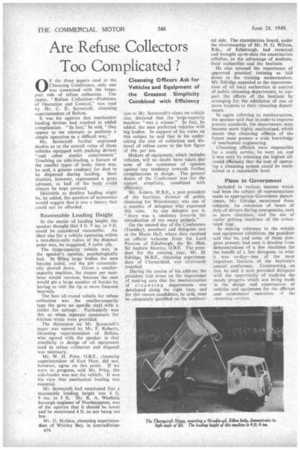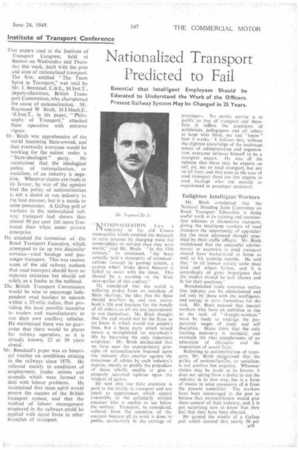Are Refuse Collectors Too Complicated ?
Page 22

Page 23

If you've noticed an error in this article please click here to report it so we can fix it.
Cleansing Officers Ask for Vehicles and Equipment of the Greatest Simplicity Combined with Efficiency
OF the three papers read at the Cleansing Conference, only one was concerned with the transport side of refuse collection. The paper, "Refuse Collection—Problems of Operation and Control," was read by Mr. C. E.• Scowcroft, cleansing superintendent of Bolton.
It was his opinion that mechanical loading devices had resulted in added complication. "In fact," he said, "they appear to me attempts to perform a simple operation in a difficult way." Mr. Scowcroft further expressed doubts as to the overall value of those vehicles equipped with packing devices " and other similar contrivances." Touching on side-loading, a feature of the smaller types of body, there was, he said, a greater tendency for dust to be dispersed during loading. Steel shutters, however, represented a great advance, as half of the body could always be kept covered.
Desirable as dustless loading Might be, he added, the question of 'economics . would suggest that it was a luxury that could not be afforded.
Reasonable Loading Height
In the matter of loading height, the speaker thought that 4 ft, 9 ins. to 5 ft. could be considered reasonable. An ideal size for a vehicle operating within a two-three-mile radius of the disposal point was, he suggested, 9 cubic yds.
The large-capacity vehicle was, in the speaker's opinion, psychologically bad. In filling large bodies the men became jaded, and the job automatically slowed down. Given a smallercapacity machine, the output per manhour would increase, because the men would get a large number of breaks by having to visit the tip at more frequent intervals.
The hest all-round vehicle for refuse collection was the smaller-capacity type (he gave no specific size) with a trailer for salvage. Particularly was this so when separate containers for kitchen waste were provided.
The discussion on Mr. Scowcroft's paper was opened by Mr. F. Roberts, cleansing superintendent of Bolton, who agreed with the speaker in that simplicity in design of all equipment used in refuse collection and disposal was necessary.
Mr. W. H. Price, 0.B.E., cleansing superintendent of East Ham, did not, however, agree on this point. If we were to progress, said Mr. Price, the side-loader was not the vehicle. It was his view that mechanical loading was essential.
Mr. Scowcroft had mentioned that a reasonable loading height was 4 ft. 9 ins. to 5 ft. Mr. R. A. Winfield, borough engineer of Northampton, was of the opinion that it should be lower and he mentioned 4 ft. as not being too low.
Mr. G. Holden, cleansing superintendent of Whitley Bay, in contradistincnI6 Lion to Mr. Scowcrofes views on vehicle size, declared that the large-capacity machine "was a winner." In fact, he added, the men preferred vehicles with big bodies. In support of his views on this subject he said that in his undertaking the cost of collection and disposal of refuse came to the low figure of 10s. per ton.
Makers of equipment, which includes vehicles, will no doubt have taken due note of the consensus of opinion against any tendency towards further complications in design. The general desire of the Conference was for the utnaost , simplicity, combined with efficiency.
Mr. Ardern, M.B.E., a past president of the Institute, director of public cleansing for Westminster, was one of a number of delegates who expressed this view. As one delegate put it, "there was a tendency towards the introduction of too many gadgets."
On the second day of the Conference (Tuesday), members and delegates met in the Music Hall, where they received an official welcome from the Lord Provost of Edinburgh, the Rt. Hon. Sir Andrew Murray, O.B.E. The president for the ensuing year, Mr. H. Edridge, M.B.E., cleansing superintendent of Chesterfield, was afterwards installed.
During the course of his address, the president laid stress on the importance of making sure that the mechanization of cleansing departments was developed along the right lines, and for this reason candidates, he said, must he adequately qualified on the mechani cal side. The examination board, under the chairmanship of Mr. N. G. Wilson, B.Sc., of Edinburgh, had reviewed and brought up-to-date the examination syllabus, to the advantage of students, local authorities and the Institute.
He also stressed the importance of approved practical training as laid down in the training memorandum. Mr. Eclridge appealed to the representatives of all local authorities in control of public cleansing departments, to support the efforts of the Institute by arranging for the admission of one or more trainees to their cleansing departments.
In again referring to mechanization, the speaker said that in order to improve present standards, the departments must become more highly mechanized, which meant that cleansing offiters of the future must possess a wide knowledge of mechanical engineering.
Cleansing officials were responsible for a costly service, he went on, and it was only by attaining•the highest all round efficiency that the cost of operat,. mg a cleansing system could be main tained at a reasonable level.
Pleas to Government
'Included in various matters which had been the subject of representations made to appropriate Goverment departments, Mr. Ed ridge mentioned these subjects: An extension of hours of duty of drivers during emergencies, such as snow clearance, and the use of trailer gritting machines of the articulated type.
In making reference to the vehicle and equipment exhibition, the president said that he, and some of those delegates present, had seen it develop from demonstrations of a few machines for the benefit of a few delegates, to what it was to-day—one of the most important features of the Institute's 'annual conference. Commenting on this, he said it now provided delegates with the opportunity of studying the steady progress which was being made in the design and construction of vehicles and equipment for the efficient and economical operation of the ,-leansinp .ervices.
Two papers read at the Institute of Transport Congress, held at Buxton on Wednesday and Thursday this week, dealt with the pros and cons of nationalized transport. The first, entitled "The Team Spirit in Transport," was read by Mr. J. Benstead, C.B.E., M.Inst.T.. deputy-chairman, British Transport Commission, who championed the cause of nationalization. Mr. Raymond W. Birch, M.I.Mech.E., M.Inst.T., in his paper, "Philosophy ' of Transport," attacked State operation with extreme vigour.
Mr. Birch was apprehensive of the world becoming State-owned, and that eventually everyone would be working for the nation under a " State-ideologist " party. He maintained that the ideological policy of nationalization, ' or socialism, of an industry is negative.. Whatever clan* are made in its favour, he was of the opinion that the policy of nationaliiation is not a desire to run industry in the best Manner, but is a mania to seize possession. A Gallup poll of workers in the nationalized railway' transport had shown that almost 50 per cent felt more frustrated than when under private enterprise. .
Be attacked the formation of the Road Transport Executive, which attempted to tie up two dissimilar services—road -haulage and passenger transport. This was reminiscent of the old railway outlook that road transport should have no separate existence but should act solely as a feeder to the railhead.
The British Transport Commission would be wise to encourage independent road hauliers to operate within a 25-mile radiuS,:thus providing the least possible incentive to traders and manufacturers to run their own ancillary vehicles. He maintained there was no guar antee that there would be places for railway operation, as it is already known, 2S or 50 years ahead.
Mr. Benstead's paper was an historical treatise on conditions existing in the railways since 1870. He referred mainly to conditions of employment, trades unions and councils which were formed to deal with labour problems. He maintained that team spirit would ensure the success of the British transport system, and that the method of labour management employed in the railWayS could be applied with equal force to other branches of transport.




























